Related Research Articles

Cameroon, officially the Republic of Cameroon, is a country in Central Africa. It shares boundaries with Nigeria to the west and north, Chad to the northeast, the Central African Republic to the east, and Equatorial Guinea, Gabon, and the Republic of the Congo to the south. Its coastline lies on the Bight of Biafra, part of the Gulf of Guinea, and the Atlantic Ocean. Due to its strategic position at the crossroads between West Africa and Central Africa, it has been categorized as being in both camps. Cameroon's population of nearly 31 million people speak 250 native languages, in addition to the national tongues of English and French, or both. Early inhabitants of the territory included the Sao civilisation around Lake Chad and the Baka hunter-gatherers in the southeastern rainforest. Portuguese explorers reached the coast in the 15th century and named the area Rio dos Camarões, which became Cameroon in English. Fulani soldiers founded the Adamawa Emirate in the north in the 19th century, and various ethnic groups of the west and northwest established powerful chiefdoms and fondoms.

Multiculturalism is the coexistence of multiple cultures. The word is used in sociology, in political philosophy, and colloquially. In sociology and everyday usage, it is usually a synonym for ethnic or cultural pluralism in which various ethnic and cultural groups exist in a single society. It can describe a mixed ethnic community area where multiple cultural traditions exist or a single country. Groups associated with an indigenous, aboriginal or autochthonous ethnic group and settler-descended ethnic groups are often the focus.

Central Africa is a subregion of the African continent comprising various countries according to different definitions. Middle Africa is an analogous term used by the United Nations in its geoscheme for Africa and consists of the following countries: Angola, Cameroon, Central African Republic, Chad, Democratic Republic of the Congo, Republic of the Congo, Equatorial Guinea, Gabon, and São Tomé and Príncipe. The United Nations Office for Central Africa also includes Burundi and Rwanda in the region, which are considered part of East Africa in the geoscheme. These eleven countries are members of the Economic Community of Central African States (ECCAS). Six of those countries are also members of the Economic and Monetary Community of Central Africa (CEMAC) and share a common currency, the Central African CFA franc.
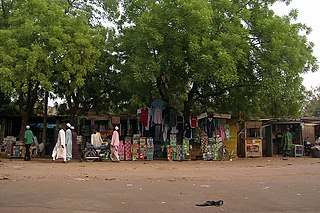
Garoua is a port city and the capital of the North Region of Cameroon, lying on the Benue River. A thriving centre of the textiles and cotton industries, the city has approximately 1,285,000 inhabitants in 2020, mostly Fulbe/Fulani people.

The Duala are a Bantu ethnic group of Cameroon. They primarily inhabit the littoral and southwest region of Cameroon and form a portion of the Sawabantu or "coastal people" of Cameroon. The Dualas readily welcomed German and French colonial policies. The number of German-speaking Africans increased in central African German colonies prior to 1914. The Duala leadership in 1884 placed the tribe under German rule. Most converted to Protestantism and were schooled along German lines. Colonial officials and businessmen preferred them as inexpensive clerks to German government offices and firms in Africa. They have historically played a highly influential role in Cameroon due to their long contact with Europeans, high rate of education, and wealth gained over centuries as slave traders and landowners.
A jengu is a water spirit in the traditional beliefs of the Sawabantu groups of Cameroon, like the Duala, Bakweri, Malimba, Subu, Bakoko, Oroko people. Among the Bakweri, the term used is liengu. Miengu are similar to bisimbi in the Bakongo spirituality and Mami Wata. The Bakoko people use the term Bisima.
Basaa, or Mbene, is a Bantu language spoken in Cameroon by the Basaa people. It is spoken by about 300,000 people in the Centre and Littoral regions.

Lesbian, gay, bisexual, and transgender (LGBT) people in Cameroon face severe challenges not experienced by non-LGBTQ residents. Both male and female same-sex sexual activity is illegal in Cameroon and LGBT people face prevalent discrimination among the broader population. As of 2020, Cameroon "currently prosecutes consensual same sex conduct more aggressively than almost any country in the world".

The Bassa are a Bantu ethnic group in Cameroon. They number approximately 800,000 individuals. The Bassa speak the Basaa language.

Cameroon is home to at least 250 languages, with some accounts reporting around 600. These include 55 Afro-Asiatic languages, two Nilo-Saharan languages, four Ubangian languages, and 169 Niger–Congo languages. This latter group comprises one Senegambian language (Fulfulde), 28 Adamawa languages, and 142 Benue–Congo languages . French and English are official languages, a heritage of Cameroon's colonial past as a colony of both France and the United Kingdom from 1916 to 1961. Eight out of the ten regions of Cameroon are primarily francophone and two are anglophone. The official percentage of French and English speakers is estimated by the Presidency of Cameroon to be 70% and 30% respectively.
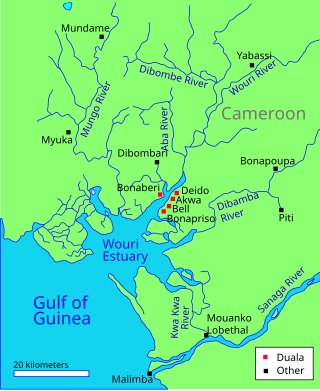
The Dibamba River is in the Littoral Region of southern Cameroon, emptying into the Cameroon estuary near the city of Doula.

The Gyele, also known as the Kola (Bakola) or Koya (Bakoya), are the pygmies of southern Cameroon and adjacent areas of Gabon and Equatorial Guinea. They live among Bantu patrons, the Mvumbo and Bassa. They speak a variety of or a language closely related to Mvumbo.
Kogo, also referred to as Bakoko and Basoo, is a Bantu language of Cameroon. North and South Kogo are as distinct from each other as they are from Basaa; they might be considered three dialects of a single language.

The Kamerun campaign took place in the German colony of Kamerun in the African theatre of the First World War when the British, French and Belgians invaded the German colony from August 1914 to March 1916. Most of the campaign took place in Kamerun but skirmishes also broke out in British Nigeria. By the Spring of 1916, following Allied victories, the majority of German troops and the civil administration fled to the neighbouring neutral colony of Spanish Guinea. The campaign ended in a defeat for Germany and the partition of its former colony between France and Britain.

Simon Pierre Tchoungui was a medical doctor who was appointed Prime Minister of East Cameroon from October 1965 until 20 May 1972, when the United Republic of Cameroon came into being.
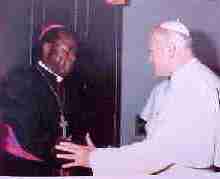
Albert Ndongmo was Bishop of Nkongsamba in Cameroon between June 1964 and January 1973. In 1970 he was arrested, accused of treasonous dealings with rebels, and sentenced to death by a military tribunal. His sentence was later commuted to life imprisonment, of which he served five years before the President ordered his release. After being released he moved to Rome and then to Canada, where he spent the rest of his life.
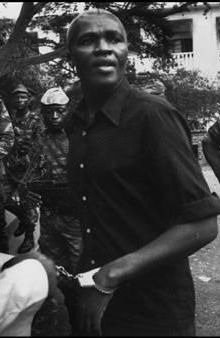
Ernest Ouandié was a leader of the struggle for independence of Cameroon in the 1950s who continued to resist the government of President Ahmadou Ahidjo after Cameroon became independent in 1960. He was captured in 1970, tried and condemned to the death. On 15 January 1971, he was publicly executed in Bafoussam.
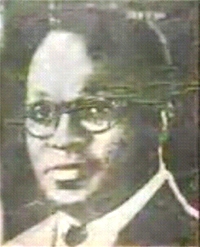
Castor Osendé Afana was a Marxist economist and militant nationalist who died in 1966 while fighting as a guerrilla against the government of Cameroon.
Bakoko may refer to:
References
- ↑ "Bakoko people". Joshua Project. Retrieved 28 August 2012.
- ↑ Appiah, Anthony; Gates, Henry Louis (17 February 2010). Encyclopedia of Africa. Oxford University Press. p. 148. ISBN 978-0-19-533770-9 . Retrieved 28 August 2012.
- ↑ Fanso, Verkijika G. (31 July 1989). Cameroon History for Secondary Schools and Colleges: Prehistoric times to the nineteenth century. Macmillan. p. 49. ISBN 978-0-333-47121-0 . Retrieved 28 August 2012.
- ↑ Jonassohn, Kurt; Björnson, Karin Solveig (1998). Genocide and Gross Human Rights Violations in Comparative Perspective. Transaction Publishers. p. 250. ISBN 978-0-7658-0417-4 . Retrieved 28 August 2012.